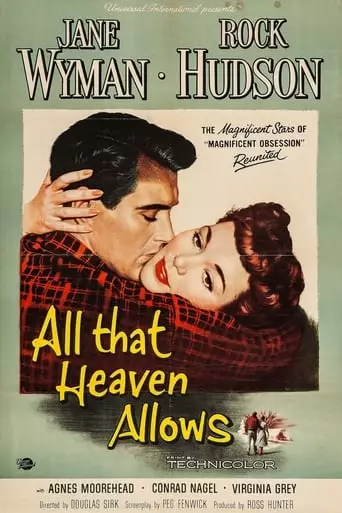Two different social classes collide when Cary Scott, a wealthy upper-class widow, falls in love with her much younger and down-to-earth gardener, prompting disapproval and criticism from her children and country club friends.
All That Heaven Allows is a 1955 American melodrama directed by Douglas Sirk, featuring Jane Wyman as Cary Scott, a widowed socialite in a small New England town. Cary’s life is routine and constrained by societal expectations until she meets Ron Kirby (Rock Hudson), a younger, down-to-earth arborist. Their burgeoning romance faces opposition from Cary’s children and social circle, who disapprove of their age difference and Ron’s modest background. Despite the societal pressures, Cary and Ron’s love story unfolds, highlighting themes of love, societal norms, and personal fulfillment.
Analysis
Douglas Sirk’s direction in All That Heaven Allows is celebrated for its visual style and emotional depth. The film employs melodramatic conventions to explore themes of love, societal expectations, and personal fulfillment. Sirk’s use of color and composition enhances the narrative, reflecting the inner turmoil of the characters. The performances are compelling, with Jane Wyman and Rock Hudson delivering portrayals that convey the pain and resilience of their characters. The film’s treatment of societal norms and personal desires was ahead of its time, offering a nuanced exploration of these themes within the context of 1950s America.
Main Themes
- Love and Social ConformityThe film explores the tension between personal desires and societal expectations. Cary’s relationship with Ron challenges the conservative norms of her community, highlighting the struggles individuals face when pursuing love outside societal conventions.
- Generational ConflictCary’s children represent the younger generation’s adherence to social norms and expectations. Their disapproval of her relationship with Ron underscores the generational divide and differing perspectives on love and happiness.
- Materialism vs. SimplicityThe contrast between Cary’s affluent lifestyle and Ron’s simple, nature-oriented life emphasizes the theme of materialism versus simplicity. The film critiques the superficial values of society and advocates for a more authentic, fulfilling existence.
- Personal Fulfillment and SacrificeCary’s journey reflects the theme of personal fulfillment and the sacrifices individuals make to achieve it. Her internal conflict and ultimate decision to pursue her happiness with Ron highlight the challenges of overcoming societal pressures for personal contentment.
Impact of the Movie
Upon its release, All That Heaven Allows received mixed reviews, with some critics dismissing it as overly melodramatic. However, over time, the film has been re-evaluated and is now considered a classic, praised for its bold storytelling and direction. Its enduring legacy in film history makes it a must-watch for cinema enthusiasts.
7 Reasons to Watch All That Heaven Allows (1955)
- Compelling StorylineThe film offers a poignant and thought-provoking narrative that delves into complex social issues, particularly the tension between personal desires and societal expectations. Its exploration of these themes through the lives of its characters provides a rich and engaging viewing experience.
- Outstanding PerformancesThe cast delivers exceptional performances, with Jane Wyman and Rock Hudson offering portrayals that are both nuanced and emotionally resonant. Their ability to convey the depth of their characters’ struggles adds significant emotional weight to the film.
- Visual MasteryDouglas Sirk’s direction is marked by his signature visual style, utilizing color and composition to enhance the emotional impact of the story. The film’s cinematography is both lush and expressive, contributing to its status as a visual masterpiece.
- Cultural SignificanceAll That Heaven Allows addresses issues of love, societal norms, and personal fulfillment with a depth and sensitivity that was ahead of its time. Its candid portrayal of these themes offers valuable insights into the societal dynamics of 1950s America.
- Emotional DepthThe film’s exploration of love, sacrifice, and personal fulfillment resonates on a deeply emotional level. Its ability to evoke empathy and reflection makes it a powerful cinematic experience.
- Historical ContextViewing All That Heaven Allows provides a window into the social and cultural attitudes of the 1950s, particularly regarding love and societal expectations. This historical perspective enriches the understanding of the film’s themes and their relevance to contemporary discussions.
- Critical AcclaimOver the years, the film has been re-evaluated and is now considered a classic, praised for its bold storytelling and direction. Its enduring legacy in film history makes it a must-watch for cinema enthusiasts.
How Will You Feel After Watching All That Heaven Allows (1955)?
After watching All That Heaven Allows, you will likely experience a profound emotional response to its exploration of complex social issues and the human condition. The film’s candid portrayal of love and societal expectations may evoke feelings of empathy and introspection. The performances, particularly by Jane Wyman and Rock Hudson, are likely to leave a lasting impression, highlighting the depth and resilience of their characters. The film’s visual style and direction may also evoke admiration for its artistic achievements. Overall, you can expect to be moved and challenged by the film’s unflinching examination of societal norms and personal desires.

